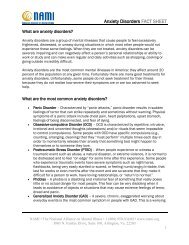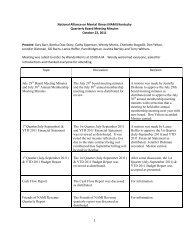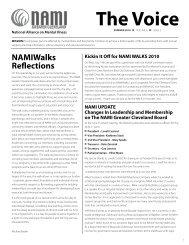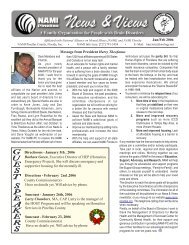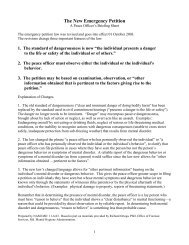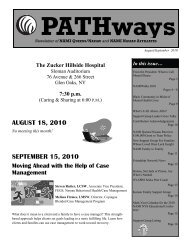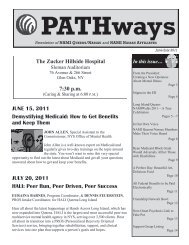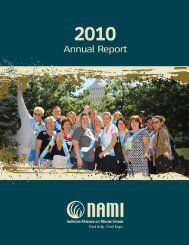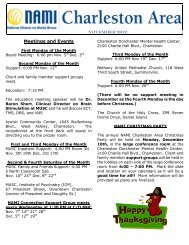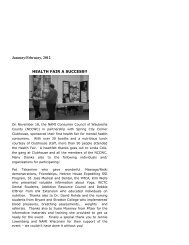Advocacy Committee Meets Congressman John Linder - NAMI
Advocacy Committee Meets Congressman John Linder - NAMI
Advocacy Committee Meets Congressman John Linder - NAMI
You also want an ePaper? Increase the reach of your titles
YUMPU automatically turns print PDFs into web optimized ePapers that Google loves.
(Continued from page 1)<br />
! "!# $%! !& '%()! $$(!<br />
thrown away, he moves to another<br />
house where he continues to hoard.<br />
A 10 year old girl keeps apologizing for<br />
"disturbing" her class. She feels that<br />
she is too restless and is clearing her<br />
throat too loudly. Her teachers are<br />
puzzled and over time become<br />
annoyed at her repeated apologies<br />
since they did not notice any sounds or<br />
movements. She is also preoccupied<br />
with "being good all the time".<br />
These people suffer from obsessivecompulsive<br />
disorder (OCD). The<br />
National Institute of Mental Health<br />
estimates that more than 2 percent of<br />
the U.S. population, or nearly one out<br />
of every 40 people, will suffer from<br />
OCD at some point in their lives. The<br />
disorder is two to three times more<br />
common than schizophrenia and<br />
bipolar disorder.<br />
What is Obsessive-Compulsive<br />
Disorder?<br />
Obsessions are intrusive, irrational<br />
thoughts -- unwanted ideas or<br />
impulses that repeatedly well up in a<br />
person's mind. Again and again, the<br />
person experiences disturbing<br />
thoughts, such as "My hands must be<br />
contaminated; I must wash them"; "I<br />
may have left the gas stove on"; "I am<br />
going to injure my child." On one level,<br />
the sufferer knows these obsessive<br />
thoughts are irrational. But on another<br />
level, he or she fears these thoughts<br />
might be true. Trying to avoid such<br />
thoughts creates great anxiety.<br />
Compulsions are repetitive rituals such<br />
as hand washing, counting, checking,<br />
hoarding, or arranging. An individual<br />
repeats these actions, perhaps feeling<br />
momentary relief, but without feeling<br />
satisfaction or a sense of completion.<br />
People with OCD feel they must<br />
perform these compulsive rituals or<br />
something bad will happen.<br />
Most people at one time or another<br />
experience obsessive thoughts or<br />
compulsive behaviors. Obsessivecompulsive<br />
disorder occurs when an<br />
individual experiences obsessions and<br />
compulsions for more than an hour<br />
each day, in a way that interferes with<br />
his or her life.<br />
OCD is often described as "a disease<br />
of doubt." Sufferers experience<br />
"pathological doubt" because they are<br />
unable to distinguish between what is<br />
possible, what is probable, and what is<br />
unlikely to happen.<br />
Who gets OCD?<br />
People from all walks of life can get<br />
OCD. It strikes people of all social and<br />
ethnic groups and both males and<br />
females. Symptoms typically begin<br />
during childhood, the teenage years or<br />
young adulthood.<br />
What causes OCD?<br />
A large body of scientific evidence<br />
suggests that OCD results from a<br />
chemical imbalance in the brain. For<br />
years, mental health professionals<br />
incorrectly assumed OCD resulted<br />
from bad parenting or personality<br />
defects. This theory has been<br />
disproved over the last 20 years. OCD<br />
symptoms are not relieved by<br />
psychoanalysis or other forms of "talk<br />
therapy," but there is evidence that<br />
behavior therapy can be effective,<br />
alone or in combination with<br />
medication. People with OCD can<br />
often say "why" they have obsessive<br />
thoughts or why they behave<br />
compulsively. But the thoughts and the<br />
behavior continue.<br />
People whose brains are injured<br />
sometimes develop OCD, which<br />
suggests it is a physical condition. If a<br />
placebo is given to people who are<br />
depressed or who experience panic<br />
attacks, 40 percent will say they feel<br />
better. If a placebo is given to people<br />
who experience obsessive-compulsive<br />
disorder, only about two percent say<br />
they feel better. This also suggests a<br />
physical condition.<br />
Clinical researchers have implicated<br />
certain brain regions in OCD. They<br />
have discovered a strong link between<br />
OCD and a brain chemical called<br />
serotonin. Serotonin is a<br />
neurotransmitter that helps nerve cells<br />
communicate.<br />
Scientists have also observed that<br />
people with OCD have increased<br />
metabolism in the basal ganglia and<br />
the frontal lobes of the brain. This,<br />
scientists believe, causes repetitive<br />
movements, rigid thinking, and lack of<br />
spontaneity. Successful treatment with<br />
medication or behavior therapy<br />
produces a decrease in the overactivity<br />
of this brain circuitry. People<br />
with OCD often have high levels of the<br />
hormone vasopressin.<br />
In layperson's terms, something in the<br />
brain is stuck, like a broken record.<br />
Judith Rapoport, M.D., describes it in<br />
her book, The Boy Who Couldn't Stop<br />
Washing, as "grooming behaviors<br />
gone wild."<br />
How do people with OCD typically<br />
react to their disorder?<br />
People with OCD generally attempt to<br />
hide their problem rather than seek<br />
help. Often they are remarkably<br />
successful in concealing their<br />
obsessive-compulsive symptoms from<br />
friends and co-workers. An unfortunate<br />
consequence of this secrecy is that<br />
people with OCD generally do not<br />
receive professional help until years<br />
after the onset of their disease. By that<br />
time, the obsessive-compulsive rituals<br />
may be deeply ingrained and very<br />
difficult to change.<br />
How long does OCD last?<br />
OCD will not go away by itself, so it is<br />
important to seek treatment. Although<br />
symptoms may become less severe<br />
from time to time, OCD is a chronic<br />
disease. Fortunately, effective<br />
treatments are available that make life<br />
with OCD much easier to manage.<br />
Is age a factor in OCD?<br />
OCD usually starts at an early age,<br />
often before adolescence. It may be<br />
mistaken at first for autism, pervasive<br />
developmental disorder, or Tourette's<br />
syndrome, a disorder that may include<br />
obsessive doubting and compulsive<br />
touching as symptoms.<br />
Like depression, OCD tends to worsen<br />
as the person grows older, if left<br />
untreated. Scientists hope, however,<br />
that when the OCD is treated while the<br />
person is still young, the symptoms will<br />
(Continued on page 3)





